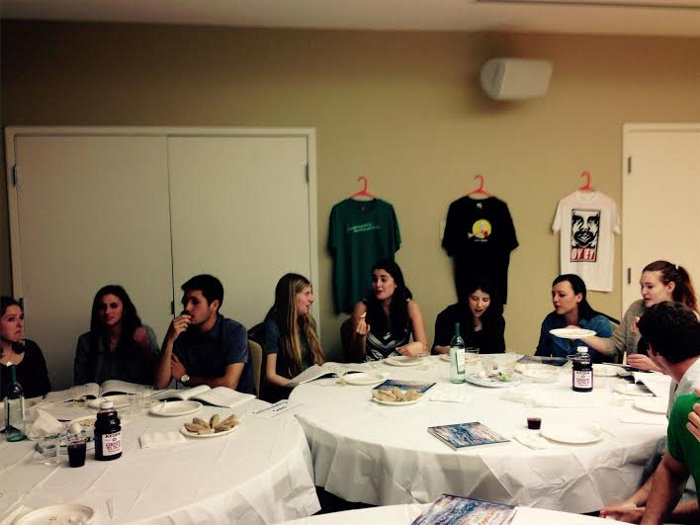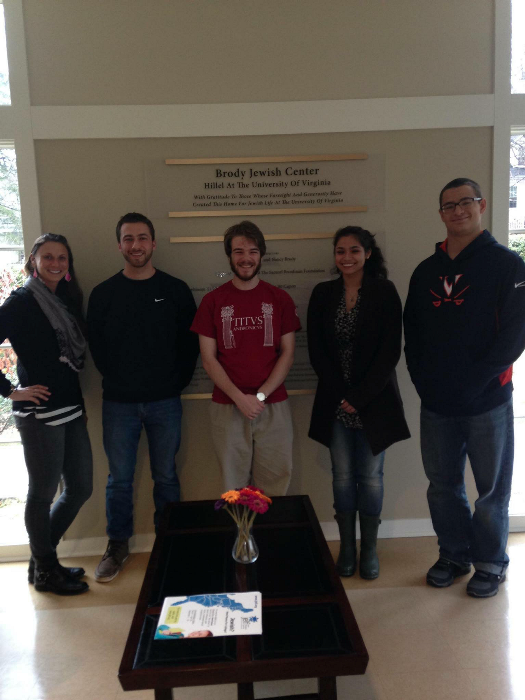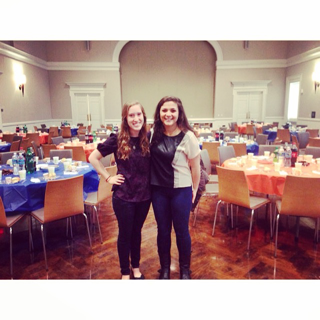At Passover, Otto Warmbier and I aimed to make the environment a topic of Jewish conversation. What are the ten plagues of climate change? How can washing our hands remind us of the importance of water conservation? Throughout the Seder, we asked participants to reflect on how the story of the Exodus and the Seder traditions relate to environmental challenges.
In my opinion, Judaism doesn't care what you say if you do not act accordingly. We could not talk about sustainability at a Passover Seder without trying to make the Seder more environmentally-friendly. Since the food was already set, we turned to the materials present at the dinner. For the Seder, we ordered compostable cups, cutlery, and plates, and coordinated with a local compost company to provide bins for disposal.When we throw things in the trash, they just sit in landfills for years, decomposing slowly and creating pollution problems for neighboring towns. We compost and recycle to divert waste away from landfills. This way, it goes on to be useful again. Education is the most important piece of a "zero waste" (only compostable and recyclable materials) practice. If no one knows what to put where or they are unaware of the impacts of their actions, then the idea is not sustainable. Clear signage and an announcement at the beginning of the Seder helped to engage people and to empower them to dispose of their waste properly. The dinner was a success, but what we are most excited for is making "zero waste" and sustainability a bigger part of what we do at Hillel. Next year, we hope to have compost at Shabbat every week and will work to expand recycling at Hillel. With environmental problems, we can rarely say, "dayeinu". There is always more that we can do to promote sustainability and to decrease our impact on the environment. - Lia Cattaneo, Peer Network Engagement Intern Class of 2016
From Israeli-Americans like myself to those of us who have just begun learning about the conflict, everyone who came out to D.C. was able to personally engage with Israel in new ways. I found it empowering to listen to some of the people directly involved in the peace process. I heard politicians speaking candidly in small settings about their obstacles to progress from their own perspectives. Hearing from Israeli and Palestinian parents who have lost their children to the violence of conflict also brought home the seriousness and urgency of our work.
The speakers, panels, and conversations from our two days at the conference also gave us a first-hand understanding of how diverse the pro-Peace camp really is. As expected, I met a lot of Jews my age that grew up caring and learning about Israel through family, school, and visits, but I was surprised to also see so many Christian, Muslim, and Latino students who had learned about the conflict more recently, as well. One student I have come to know personally is a first generation Pakistani-American from Maryland who first studied the conflict in high school. She has since studied abroad in Jerusalem, traveled throughout Israel and the West Bank, and become a leader on J Street U’s National Student Board. At the conference she gave an impassioned speech about urging attendees to take ownership of our future by working towards a two-state solution. Bringing back my experiences at the conference to grounds, I hope that J Street UVa can play a role in fostering constructive spaces for engaging with Israel. We want to give students from various backgrounds the chance to grapple with the complex moral issues and political realities in Israel. It is my hope that the Jewish, Palestinian, and the broader UVa community will join our efforts to combat apathy and promote productive action while maintaining a respectful environment. - Ori Shimony
Four years later, Shabbat 300 is still a roaring success. Several groups help make this night possible: The Jewish Leadership Council helps recruit the 300 participants and spends hours setting up the food. Hillel staff members handle logistics and spend hours purchasing food, utensils, drinks, and more. Channah Meyere, with Chabad at UVA, spends weeks preparing and cooking all of the food in her home. This year, we also recruited the brothers of Alpha Epsilon Pi to help serve dinner. The cooperation among all of these groups made the night possible.
This year’s Shabbat 300 was bittersweet for me. I can’t believe I’ve come to see four Shabbat 300s now, and that I may not be here next year for the 5th Annual. (But who knows, maybe I’ll make a guest appearance...) Shabbat 300 is now a staple at the University. Faculty and students look forward to this event for the entire year. This year’s dinner was a perfect reminder of how strong the Jewish community is at UVA, and how it has grown stronger since my 1st year. Jewish life has played a huge part of my college experience, and I am so grateful for events like Shabbat 300 to remind me how lucky I am. Pausing to look around the room during each year’s Shabbat 300 is one of my favorite memories as a WaJew. It’s been so special for me to see the event grow and succeed throughout the past years. I hope to come back in future years to Shabbat 400 or 500 – of course, we would need to find a new space since Newcomb Ballroom only seats 300! Wajewwa! Sheryl Greene Chair of the Jewish Leadership Council Class of 2015 |
The Brody Jewish Center, Hillel at the University of Virginia, is the focal point in a renaissance of Jewish life for the 1,000 Jewish students on Grounds. Archives
September 2021
Categories
All
|



 RSS Feed
RSS Feed